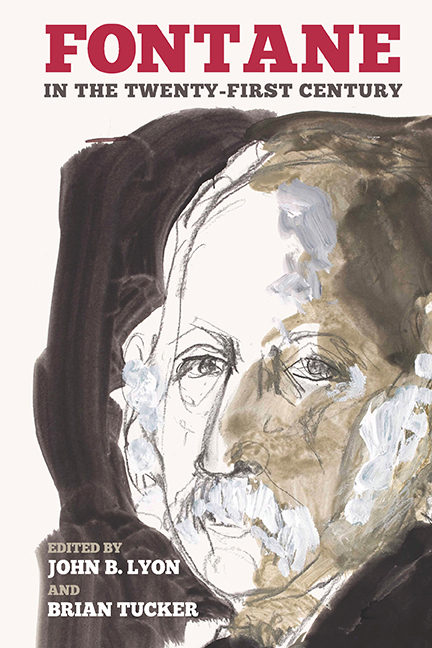Book contents
- Frontmatter
- Contents
- Acknowledgments
- Note on Editions
- Introduction: Fontane in the Twenty–First Century
- 1 Narrative Digression and the Transformation of Nationhood in Vor dem Sturm
- 2 Nasty Women: Female Anger as Moral Judgment in Grete Minde and Effi Briest
- 3 Performing the Philistine: Gossip as a Narrative Device and a Strategy for Reflection on Anti-Semitism in Theodor Fontane's L'Adultera
- 4 To Have an Eye: Visual Culture and the Misapprehension of Class in Irrungen, Wirrungen
- 5 Fontane as a Pacifist? The Antiwar Message in Quitt (1890) and Fontane's Changing Attitude to Militarism
- 6 Disjunctive Transnationalisms in Fontane's Frau Jenny Treibel
- 7 On the “Right Measure” in Effi Briest: Ethics and Aesthetics of the Prosaic
- 8 Transfiguration, Effect, and Engagement: Theodor Fontane's Aesthetic Thought
- 9 Fontane and World Literature: Prussians, Jews, and the Specter of Africa in Die Poggenpuhls
- 10 Von Zwanzig bis Dreißig: The Male Author in Parts
- 11 Melusine von Barby's Barriers and Connections in Fontane's Der Stechlin
- 12 Senescence and Fontane's Der Stechlin
- Notes on the Contributors
- Index
6 - Disjunctive Transnationalisms in Fontane's Frau Jenny Treibel
Published online by Cambridge University Press: 31 August 2019
- Frontmatter
- Contents
- Acknowledgments
- Note on Editions
- Introduction: Fontane in the Twenty–First Century
- 1 Narrative Digression and the Transformation of Nationhood in Vor dem Sturm
- 2 Nasty Women: Female Anger as Moral Judgment in Grete Minde and Effi Briest
- 3 Performing the Philistine: Gossip as a Narrative Device and a Strategy for Reflection on Anti-Semitism in Theodor Fontane's L'Adultera
- 4 To Have an Eye: Visual Culture and the Misapprehension of Class in Irrungen, Wirrungen
- 5 Fontane as a Pacifist? The Antiwar Message in Quitt (1890) and Fontane's Changing Attitude to Militarism
- 6 Disjunctive Transnationalisms in Fontane's Frau Jenny Treibel
- 7 On the “Right Measure” in Effi Briest: Ethics and Aesthetics of the Prosaic
- 8 Transfiguration, Effect, and Engagement: Theodor Fontane's Aesthetic Thought
- 9 Fontane and World Literature: Prussians, Jews, and the Specter of Africa in Die Poggenpuhls
- 10 Von Zwanzig bis Dreißig: The Male Author in Parts
- 11 Melusine von Barby's Barriers and Connections in Fontane's Der Stechlin
- 12 Senescence and Fontane's Der Stechlin
- Notes on the Contributors
- Index
Summary
THEODOR FONTANE's 1892 NOVEL Frau Jenny Treibel foregrounds conflicts within the Prussian middle class, specifically between the Besitzbürgertum (propertied middle class) and the Bildungsbürgertum (educated middle class). Onto the divisions between these two subgroups Fontane projects binary oppositions such as modern and traditional, prose and poetry, and materialism and idealism, respectively. The subtitle of the novel, “Wo sich Herz zum Herzen find't” (14:3; When Heart to Heart Is Paired, 46), suggests that the novel might reconcile these polarities. Indeed, as Hugo Aust notes, resolution was an essential aesthetic criterion when Fontane reviewed literary works as a critic. Yet we do not find real resolution in this novel, for Fontane portrays these two groups as irreconcilably divided. If hearts are paired in the novel, then it occurs only within each subgroup of the Bürgertum, not across their boundaries.
What relevance might this unresolved nineteenth-century internecine class conflict have for the first half of the twenty-first century? In this novel Fontane stages a conflict with implications broader than the narrow temporal and geographical confines of nineteenth-century bourgeois Berlin society. He maps the distinctions within the Berliner bourgeoisie onto conceptions of both the nature and geography of Europe: on the one hand, a more modern, industrialized Europe, characterized by commerce and identified with Northern and Western Europe, England in particular; on the other, an ancient Europe, grounded in a rich cultural tradition and identified with Southern and Southeastern Europe, specifically Italy and Greece. The failed attempts to reconcile the differences between subgroups of the bourgeoisie reflect pessimism not only toward class reconciliation but also toward attempts at reconciliation and unity on a transnational scale. The inability to overcome the rift between Besitzbürgertum and Bildungsbürgertum, between materialism and culture, suggests that, in Fontane's perspective, attempts at transnational unity such as we find in the twentieth and twenty-first centuries will only perpetuate the failed attempts to reconcile these differences.
To some it might seem far-fetched to search for transnational and global issues in Fontane, who has been described as a Berlin author, a “particularist of the metropolis.” Yet Fontane was keenly aware of the world outside of Germany, not least from his time as a foreign correspondent in London (1855–59). In a recent article Roland Berbig offers a close historical reading of the first week of May during Fontane's 1858 visit to London as a demonstration in nuce of Fontane's international awareness and engagement.
- Type
- Chapter
- Information
- Fontane in the Twenty-First Century , pp. 103 - 120Publisher: Boydell & BrewerPrint publication year: 2019



